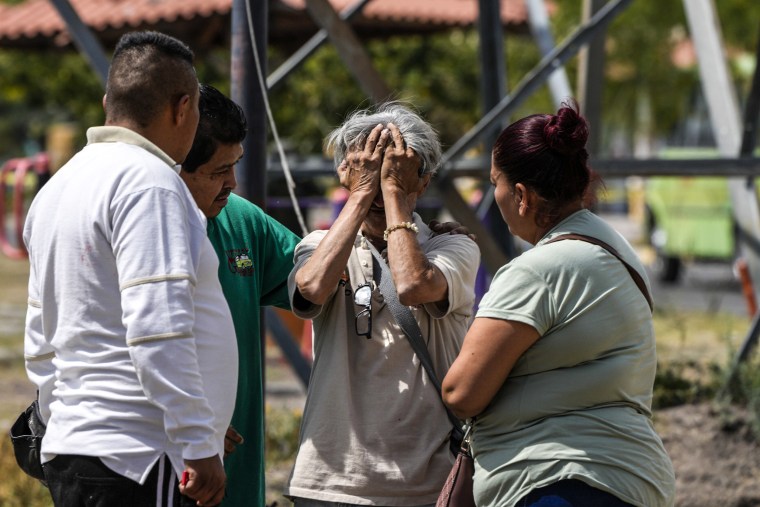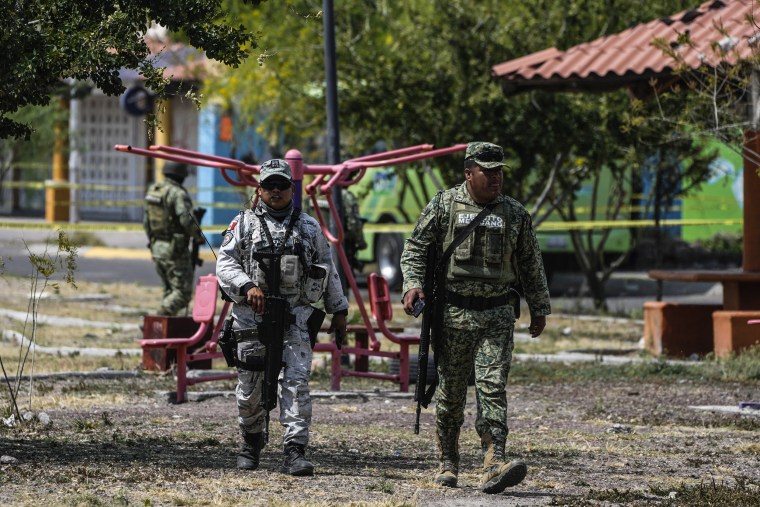Police in Celaya, Mexico, refuse to give up or negotiate with cartels
CELAYA, Mexico — A dead man lay on his back in the parking lot of a convenience store in late February when journalists rolled in to the north-central Mexico city of Celaya to interview police. A spray of bullet casings and spent projectiles lay around the corpse, a sight all too common in Guanajuato state, which has Mexico’s highest number of homicides.
A policeman had been driving his wife to work on Feb. 28 when cartel gunmen — who had apparently followed from them home — opened fire on their car. The policeman killed one attacker before dying.
His wife and 1-year-old daughter were unharmed. But a week earlier, cartel gunmen shot a police officer to death while she took her 8-year-old daughter to school. They killed the girl, too.
Welcome to Celaya, arguably the most dangerous place, per capita, to be a cop in North America. At least 34 police officers have been killed in this city of 500,000 people in the last three years. In Guanajuato state, its population just over 6 million, more police were shot to death in 2023 — about 60 — than in all of the United States.
As Mexico’s June 2 presidential election approaches, this city lies at the crossroads of a national debate about security policy.
Celaya has declined to follow President Andres Manuel López Obrador’s policy of not confronting the cartels, and ignored his policy of encouraging local people to seek out peace pacts with the gangs. When Roman Catholic bishops announced they had met with cartel bosses in February to negotiate a truce between warring gangs, López Obrador said, “I think it is very good.”

Mexico’s president dislikes police and would like to rely on the military for everything. He dissolved the old federal police, accusing them of corruption, and cut almost all federal funding for training and equipping local police.
Unlike some other cities, Celaya, a farming and industrial hub northwest of Mexico City, has refused to eliminate its local police force and then rely almost completely on soldiers and the quasi-military National Guard for policing.
That means it has had to take on the Santa Rosa de Lima cartel, a gang so unreflectively violent that any sort of truce or negotiation was probably out of the question anyway.
“The Santa Rosa de Lima cartel controlled Celaya,” said Guanajuato security analyst David Saucedo. “The current mayor, Javier Mendoza, made the decision to break the criminal control. It was a decision that cost the life of his son,” who was shot to death last year.
Now the cartel is trying to hunt Celaya’s cops into submission, or extinction. Two officers were killed in their car Sunday in Irapuato, the next town over, and the Santa Rosa de Lima cartel left a claim of responsibility.
Killings of police in Mexico rose last year even as López Obrador says overall homicide numbers have dropped under his administration.
“The safety of the public is not something you can negotiate. Never,” said Celaya police chief Jesús Rivera Peralta. “These criminals have no values … we can’t negotiate with the devil, that’s impossible.”
Rivera Peralta said he is proud of the mayor’s slogan: “With everything, come what may, without fear.”
Under the president’s approach, Mexico has both a shortage of police — there are none in some towns — and, at the same time, thousands of experienced former federal police officers who chose not to join the militarized National Guard are now unemployed.
Celaya decided to hire some of them.
Rivera Peralta, like most of his force, is a former member of the federal police. They’re almost all from outside Celaya. They live in secure barracks and go out only to patrol, earning the nickname “Fedepales,” a combination of the word “federal” and “municipal.”
Because they’re outsiders, the new cops are less likely to have ties to the cartel, Saucedo said.

Most of the locals who used to work as municipal police have resigned, and it’s easy to see why. Estefani, a Celaya policewoman who would not give her last name for security reasons, narrowly escaped an attack as she drove to work in early 2023. The cartel apparently knew her route.
“I stopped at a red light, and all I saw were two men on a motorcycle shooting at me,” Estefani said. “I was hit by three rounds. One shot went into the left side of my face … the bullet was lodged in my neck.”
As blood streamed, she walked to a clinic. Doctors managed to stabilize her.
It was all too common.
“Right…
Read More: Police in Celaya, Mexico, refuse to give up or negotiate with cartels

